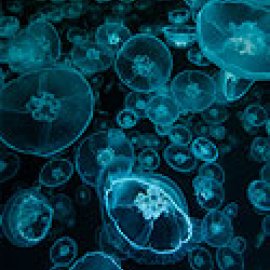Gloucester Marine Genomics Institute
-
English
-
ListenPause
Intro music
Welcome to World Ocean Radio…
I’m Peter Neill, Director of the World Ocean Observatory.
Sometimes innovation lies right before your eyes. That happened to me recently when I attended a conference of marine educators in Gloucester, Massachusetts. The conference was exciting in that there was such evident enthusiasm for marine science at the secondary school level, an essential part of the inter-generational knowledge and awareness required to understand and implement structures and behaviors to conserve ocean resources for the future.
The second day, I signed up for a field trip, to the Gloucester Marine Genomics Institute, located on a pier in that primarily fishing town, in a compelling contrast of the most advanced science, as a 21st century occupation, alongside trawlers and lobster boats, a 19th century livelihood now threatened by over-fishing and climate change. The contrast was a telling juxtaposition of study and utilization of marine resources over time—a past adjacent to a future—and it was as exciting to see as the enthusiasm of the teachers the day before.
Founded in 2008, the Institute’s mission is: first, to study the marine environment for solutions facing the ocean and human health through investigation of marine organisms and their potential relationship to biomedicine and biotechnology, specifically to cancer resistance, longevity, and other aspects of healthy aging; and, second, to relate that study to ecosystem function, resilience and adaptation to environmental change, leading to better ecosystem managemet; and, third, to promote sustainable fisheries and ensure global marine security. A state-of-the-art research facility has been constructed to house the tools and engage the research scientists to pursue these goals. Work I observed included DNA sequencing of indigenous lobster and sea urchin; genetic markers for prediction of spawning populations of codfish; assessment of taxa in the sediment of the adjacent marine protected area off Stellwagon Bank; tools for the detection of infections in organisms used for aquaculture; tools for addressing harmful algal blooms; and study of the medicinal value of local marine plants and seaweeds. The ocean is a global knowledge bank, and these projects represent the value of assets deposited to be conserved, and profits derived in treatments for diseases we suffer from today and tomorrow.
To achieve that goal, the Institute has established a Research Innovation Fund, $20 million beyond government grants to meet research opportunities as they arise and attract new scientists by funding for early-stage research.
But the Institute surprised me in two additional, important ways:
First, in 2016, the Institute created the Gloucester Biotechnology Academy, a no-cost, year-long certificate program. Seven months of lab learning followed by a three-month industry internship, designed to train local high students, the majority under-served by conventional education, for occupation as professional laboratory technicians in the life sciences. 40 students a year, over 1000 to graduates to date, with graduation rate of 80%, 95% hired by biotech companies, many direct from internships, without 4 years of college and no academic debt. I sat with several students to talk about their backgrounds, the academy training experience that included money management and inter-personal relations, and their optimism for the future beyond inhibiting circumstance and minimal prospect leading to meaningful work in biochemistry, medical and clinical research, forensic and animal science, and microbiology.
Second, the Institute sits in a growing community of some 38 biotech companies in the Cape Ann region, and has begcome an attractive physical space on the Gloucester waterfront its own cluster of related businesses to include LifeMine Therapeutics that uses genomic technologies to discover and develop a pipeline of novel medicines, and Hefring Engineering, a research and development company focused on intelligent and scalable autonomous sub-sea vehicles that may serve future Institute research. Such ocean clusters are a growing phenomenon globally, with developed locations in Iceland, Alaska, New Bedford, Massachusetts, and Portland, Maine.
We have long argued for the ocean as an extraordinary resource for the future of food security and human health. These initiatives are the evidence of the growing realization that ocean conservation and sustainability are key if that future is to be realized. As the impact of climate change continues to become evident, we understand that our response to that consequence, more and more, will rely on the ocean as the single, essential natural resource that connects us all.
We will discuss these issues, and more, in future editions of World Ocean Radio.
Outro music
Learn more about the Gloucester Marine Genomics Institute at gmgi.org.
A November visit to Gloucester Massachusetts for an Ocean Literary Conference (NEOSEC 2023) afforded W2O staff an opportunity to take a field trip to the Gloucester Marine Genomics Institute. Founded in 2008, the Institute is on the cutting edge of 21st century science, studying the marine environment for solutions to issues facing the ocean, sustainably fisheries, human health, to better understand ecosystems, and the ocean's medicinal value for today and tomorrow. In addition to their state-of-the-art research laboratories, GMGI is promoting technical training for lab techs through their Biotechnology Academy, a no-cost, year-long certificate training program with astonishing results.
About World Ocean Radio
World Ocean Radio is a weekly series of five-minute audio essays available for syndicated use at no cost by college and community radio stations worldwide. Peter Neill, Director of the World Ocean Observatory and host of World Ocean Radio, provides coverage of a broad spectrum of ocean issues from science and education to advocacy and exemplary projects.
- Login to post comments



